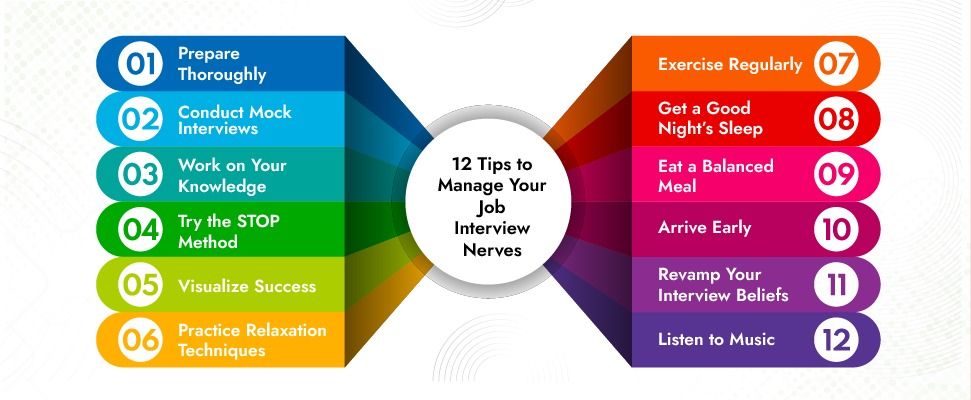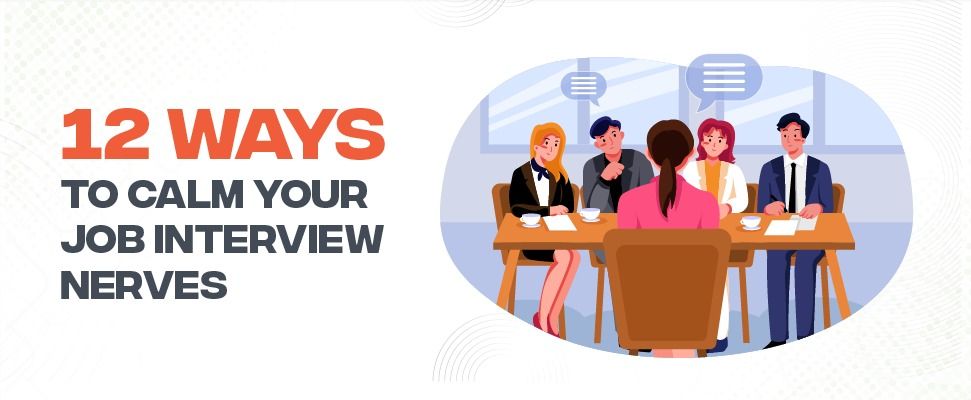Table of Contents
ToggleIntroduction
I remember my first job interview vividly—I was a bundle of nerves. My hands were sweaty, my mind was foggy, and I couldn’t muster the courage to speak. Even with 20 years of solid experience on my resume, I still get the jitters before interviews. The point is, job interviews can be a nerve-wracking experience, whether you are a novice or a seasoned professional. A JDP survey reveals that 93% of candidates have experienced job interview anxiety at some point in their careers. Of those surveyed, 41% worry about struggling to answer difficult questions, while 20% are concerned about appearing nervous during their interviews. But with the right strategies, you can keep your anxiety in check and present your best self. Here are 12 effective ways to calm your nerves before and during your interview:

Don't miss out on your chance to work with the best
Apply for top global job opportunities today!
12 Tips to Manage Your Job Interview Nerves

1. Prepare Thoroughly
Thorough preparation is key to reducing anxiety. Research the company, understand the role, and familiarize yourself with your resume. Practice common interview questions and rehearse your answers until you feel confident. The more prepared you are, the less anxious you’ll feel.
2. Conduct Mock Interviews
Practice makes perfect. Conduct mock interviews with a friend or mentor to simulate the interview experience. This can help you feel more comfortable and confident when the actual interview takes place.
3. Work on Your Knowledge
One of the most effective ways to manage stress during a job interview is to thoroughly work on your knowledge. Being well-prepared not only boosts your confidence but also enhances your ability to handle unexpected questions and situations with ease.
4. Try the STOP Method
The STOP method is a powerful mental technique to help you handle stressful situations effectively.
Follow these steps:
- Stop whatever you are doing and direct your attention to your thoughts.
- Take several deep breaths to calm yourself.
- Observe the sensations in your body. Pay attention to your emotions, thoughts, and the reasons behind them.
- Proceed with your actions, integrating the insights gained from your observations.
The STOP method helps you pause and become mindful of your actions and feelings, reminding you that you have control over your thoughts and responses.
5. Visualize Success
Spend a few minutes each day visualizing yourself succeeding in the interview. Imagine the interviewer smiling, nodding, and offering you the job. Positive visualization can boost your confidence and reduce anxiety.
6. Practice Relaxation Techniques
7. Exercise Regularly
Regular physical activity is a great way to manage stress. Exercise releases endorphins, which are natural mood lifters. Even a short walk or some light stretching before your interview can help calm your nerves.
8. Get a Good Night’s Sleep
Adequate sleep is crucial for optimal brain function and emotional regulation. Ensure you get a good night’s sleep before the interview to help you stay focused, alert, and calm.
9. Eat a Balanced Meal
10. Arrive Early
Plan to arrive at least 10-15 minutes early. This buffer time can help you relax and get comfortable with the surroundings, reducing the stress of running late.
11. Revamp Your Interview Beliefs
Change negative beliefs about interviews. Instead of viewing the interview as a high-stakes test, see it as a conversation where both parties assess the fit. Remember that the interviewer wants you to succeed—they invited you for a reason.
12. Listen to Music
Additional Tips
- Practice Diaphragmatic Breathing: Slow, deep breaths can lower your heart rate and reduce feelings of anxiety.
- Do a Power Pose: Standing in a power pose for a few minutes before your interview can boost your confidence.
- Smile: Smiling can reduce stress and make you feel more at ease.
- Ask Questions: Prepare thoughtful questions to ask the interviewer. This shows your interest in the role and can make the interview feel more like a conversation.
- Call Someone: Talking to a supportive friend or family member before your interview can help calm your nerves.
- Remember That Mistakes Happen: Don’t be too hard on yourself if you stumble over a question. Everyone makes mistakes, and it’s how you recover is what matters.
Must Read: BEST TIPS FOR NAILING CODING INTERVIEWS? Conclusion
Nervousness is a natural response to job interviews, but with these strategies, you can manage your anxiety and present yourself with confidence. Remember, interviews are a two-way street. they’re not just about the employer evaluating you, but also about you finding the right fit for your career goals.
Good luck!
Take control of your career and land your dream job
Sign up with us now and start applying for the best opportunities!

FAQs
- Several copies of your resume.
- A list of references.
- A notepad and pen for taking notes.
- Any work samples or a portfolio if relevant to the job.
- Identification and any required documents if requested by the employer.
Start with a brief overview of your professional background, highlighting key experiences and achievements relevant to the job. Mention your current position, previous roles, and your education. Conclude with why you’re excited about this opportunity and how your skills and experiences make you a great fit for the role.
- Take a moment to think before answering.
- Break down the question and address each part systematically.
- If unsure, it’s okay to ask for clarification or say you need a moment to gather your thoughts.
- Be honest if you don’t know the answer but explain how you would find the solution or highlight a related skill or experience.
- Can you describe a typical day in this position?
- What are the biggest challenges facing the team right now?
- How do you measure success in this role?
- Can you tell me more about the team I would be working with?
- What are the opportunities for professional development and growth?
- Do your research to understand the typical salary range for the position and industry.
- Provide a range based on your research and state that you’re open to negotiation based on the overall compensation package.
- If possible, try to defer the salary discussion until you have a better understanding of the role and responsibilities.
- Take a few deep breaths to calm yourself.
- Pause for a moment to collect your thoughts before answering questions.
- Remember that it’s okay to take a sip of water or ask for a brief moment to think.
- Focus on your preparation and the points you want to convey.

